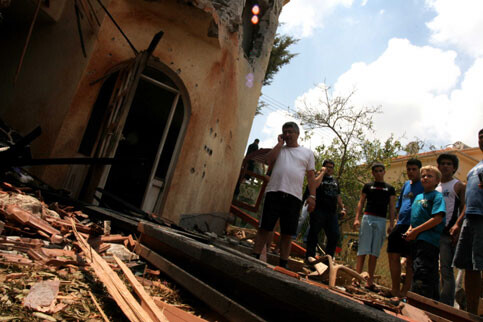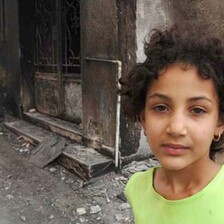Electronic Lebanon 20 July 2006

Israelis inspecting a house damaged by Katyusha rockets, fired by Hezbollah from southern Lebanon, in the northern city of Karmiel 15 July 2006. (MaanImages/Moti Milrod)
The patterns and routines of the war have become evident in the last eight days. The day usually begins with huge headlines about overnight Israeli operations meant to buck up morale with reports about tons of explosives dropped into Hizbollah hiding places or ground operations by elite special operations forces hunting Katyusha launchers or Hizbollah squads trying to infiltrate Israel across the northern border. By mid morning it becomes evident that the tons of explosives did not manage to kill the Hizbollah leadership, and the guerrilla group’s rockets begin flying into Israel, hitting towns and villages throughout the Galilee. But by noon, a relative, tense calm descends over the hills of northern Israel. IDF cannon fire continues into south Lebanon, the air sorties continue over Tyre, Beirut, eastern Lebanon and everywhere else the IAF spots suspicious trucks. And then, in the late afternoon, as dusk begins to settle over Galilee, just as it seems that perhaps the day will have passed without significant casualties on the Israeli side, a barrage of rockets flies into Israel’s northern cities and the cycle resumes.
There is talk — but only talk — of Israel launching a massive ground operation into Lebanon, to once and for all, as the proponents say, to clear south Lebanon of Hizbollah militiamen and their rockets. Those in favor of such an operation tend to be rightist politicians like Likud MK Yisrael Katz, whose rise in Likud politics began when he served as an aide to then-defense minister Ariel Sharon. On Army Radio today, Katz eerily echoed Menachem Begin, and apparently unwittingly so, when he said that Israel has to get over the ‘Lebanon trauma and go into Lebanon in full force to get the job done.’ Begin, in his day, proudly explained that Operation Peace for Galilee, more popularly known as the Lebanon War, would ‘once and for all erase the trauma of the Yom Kippur war.’ Katz, now in the opposition and far from the reigns of power, tried to sweeten his vision of a corps of Israeli soldiers riding tanks and APCs into the quagmire of Lebanon, by saying, ‘they won’t be going into to stay there, just to do the job and get out’ - shades of Begin and Sharon’s promise of an incursion that would only go as far as 40 kilometers, the range of the Katyushas that were in the hands of the PLO at the time.
Cabinet Secretary Yisrael Maimon, pressed by Israel Radio’s Ayala Hason did admit today that there are plans for a massive incursion into Lebanon, but those plans are ‘not on the agenda.’ Instead, the current ground operations, he said, would suffice. Those operations are by elite commando units, target spotting for the aircraft overhead or ambushing Hizbollah cells still operating in south Lebanon - or much further north. Surprisingly, one of Israel’s biggest hawks, MK Effie Eitam, a reserve brigadier general who often proposes using massive force to solve problems, spoke frankly this morning in Israel Radio, admitting that a massive ground incursion would splinter the ‘national consensus’ that backs the military operations against Hizbollah. Interestingly, Prime Minister Ehud Olmert is said to have held a meeting with Eitam, who in the 1990s was a general in the north, spending most of his time in the so-called security zone that Israel eventually quit in May 2000.
The consensus is holding largely because the media is still behind the operation, and focused on the empty streets of the northern communities and the individual suffering of various families who have lost relatives to the rockets or seen their life possessions demolished in a moment. Of the many, many hours of television time devoted daily to the violence, only a few minutes are given to the scenes from Lebanon. Regular programming has disappeared from the three main channels. Eitam is probably right. A ground invasion would indeed raise the specter of a lengthy stay in hostile territory and casualties among Israeli soldiers and that would certainly lead to protests.
So, the Israeli air war over Lebanon continues and the Hizbollah’s missile war against Israel continues. The outlines of a solution are becoming clear — a ceasefire, a prisoner exchange, a Lebanese Army or multinational force led by Americans or British deployment in south Lebanon and some form of disarmament of Hizbollah - but how the sides will get there remains a mystery. The Americans are now indicating that Condoleezza Rice will make two trips to the region - one next week, to test the waters, and another a week later, to package the deal. Until then, Israel can continue pounding Hizbollah, but has been told by Washington to stop hitting Lebanese infrastructure. According to Channel 10 last night, Olmert has received messages from Arab leaders, including some who have no diplomatic ties with Israel, ‘strengthening his hand’ in the Israeli battle against the Iranian-backed Hizbollah. One concern raised in the media is whether the Americans are trying to push Israel into attacking Syria, especially since it seems that at every opportunity, President Bush points his finger at Damascus as a culprit in the affair.
Meanwhile, the Hamas government and Gaza are still under siege in the south, the West Bank is under ‘closure,’ meaning no workers are allowed into Israel, and whatever solution is found for the north and Lebanon will be kept separate, by Israel, from whatever solution is found for the south and the Palestinians. The long, hot summer has only begun.
Related Links
Based in Tel Aviv, Robert Rosenberg is a senior editor, translator and newswriter at the International Herald Tribune-Haaretz. This article was originally published at www.ariga.com


